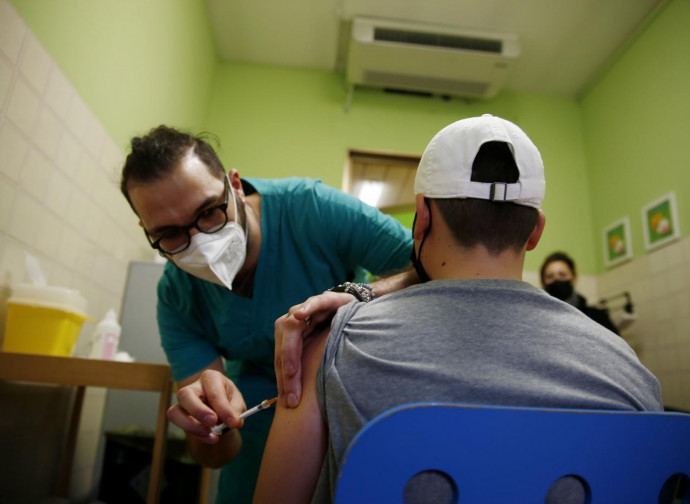Cases of Miocarditis increase amongst young males vaccinated with mRNA vaccines
The Northern European study published on the prestigious online medical database JAMA Cardiology, has registered a significant increase in post- mRNA vaccine cases of myocarditis, especially amongst young males aged between 16 and 24 years. There are more cases post-Moderna than those post-Pfizer, as the Moderna dose contains a more concentrated amount of the mRNA messenger. This data confirms the numerous cases of myocarditis amongst young athletes, yet the administration of vaccine is still imposed, without knowing the clinical history of the patient, or providing them with an initial clinical evaluation.

A few days ago an important Northern European study was published in the prestigious JAMA Cardiology journal on 23 million people subjected to mRNA vaccination (Pfizer and Moderna) with the aim of verifying the incidence of hospital admissions following myocarditis and pericarditis in the 28 days after the first or second vaccination dose (Karlstad O et al, SARS-CoV-2 vaccination and myocarditis in a Nordic Cohort study of 23 million residents, JAMA Cardiology, 2022; April 20: E1-E13).
The results of this study, which are especially important considering the sheer size of the numbers involved, confirm previously published assertions based upon relevant studies (Mevorach D et al, Myocarditis after BNT162b2 vaccine against Covid-19 in Israel, N Engl J Med published on line Oct 6,2021. Doi:10.1056/NEJMoa2110737.Montgomery J et al, Myocarditis following immunization with mRNA COVID-19 vaccines in members of the US military. JAMA Cardiol ,2021; 6(10):1202-1206) which have recognized a significant incrementation in cases of post mRNA vaccine myocarditis as compared to control groups.
This incrementation is most notable amongst members of the male sex, commencing with the first dose (1.4 times), yet exponentially more so with the second dose (from 2.04 times with the Pfizer vaccine to 8.55 time with Moderna). When one evaluates the cohort of young males between the ages of 16 – 24 years, the percentages rise to 5.31 times with the second dose of Pfizer to 13.83 times with Moderna, in which the messenger mRNA is more concentrated.
With respect to the data regarding the mortality rates caused by myocarditis after 28 days post-administration of the mRNA vaccine, the study registered a .8% mortality rate amongst the non-vaccinated, a .2 % rate post -Pfizer administration, and a 4.5% rate after the second dose of Moderna. There were no cases of deaths observed amongst the under-40 age groups. It must be understood that this data refers exclusively to those individuals who were hospitalized for this particular pathology, and is therefore an underestimation of the actual number of cases of myocarditis and pericarditis which were not medically evaluated in a hospital setting.
This data confirms that which was drawn to our attention in a recent article documenting the rise in cases of myocarditis amongst young athletes (Chouchana L et al, Features of Inflammatory Heart Reactions Following mRNA COVID-19 Vaccination at a Global Level. Clin Pharmacol Ther. 2022 Mar;111(3):605-613. doi: 10.1002/cpt.2499).
One must remember that myocarditis is an inflammatory illness of the cardiac muscle tissue, which can procure acute - even mortal – forms of damage, ranging from severe ventricular arrhythmias causing sudden death, to cardiac failure and cardiogenic shock. Myocarditis may also cause persistent evolving damage which modifies cardiac function over longer periods of time. As we have observed over the past 8 months, those individuals who participate in sport at a highly competitive level are placed under greater cardiac stress, and are therefore at greater risk of the aforementioned complications (Cadegiani FA,Catecholamines are the key trigger of mRNA SARS-CoV-2 and mRNA COVID-19 vaccine-induced myocarditis and sudden deaths: a compelling hypothesis supported by epidemiological, anatomopathological, molecular and physiological findings, ResearchGate ,Feb 22- pre print).
This aforementioned data indicates how mRNA vaccines are substances which may be accompanied by significant side effects at a cardiac level, and for this reason must be administered with great attention, taking clinical evaluations of the patient into consideration, performing follow-up visits post- inoculation, taking into account the age of the patient and therefore also the risk/benefit ratio, as well as the dose to be administered. The Moderna vaccines, in fact, have a higher concentration of mRNA, and have also registered a higher level of myocarditis than the Pfizer product.
This is therefore a plea to all of my medical colleagues, to reclaim their profession, which signifies, essentially to “take action according to science and one’s conscience, in the exclusive interest of one’s patient”.
* Professor of Cardiology
